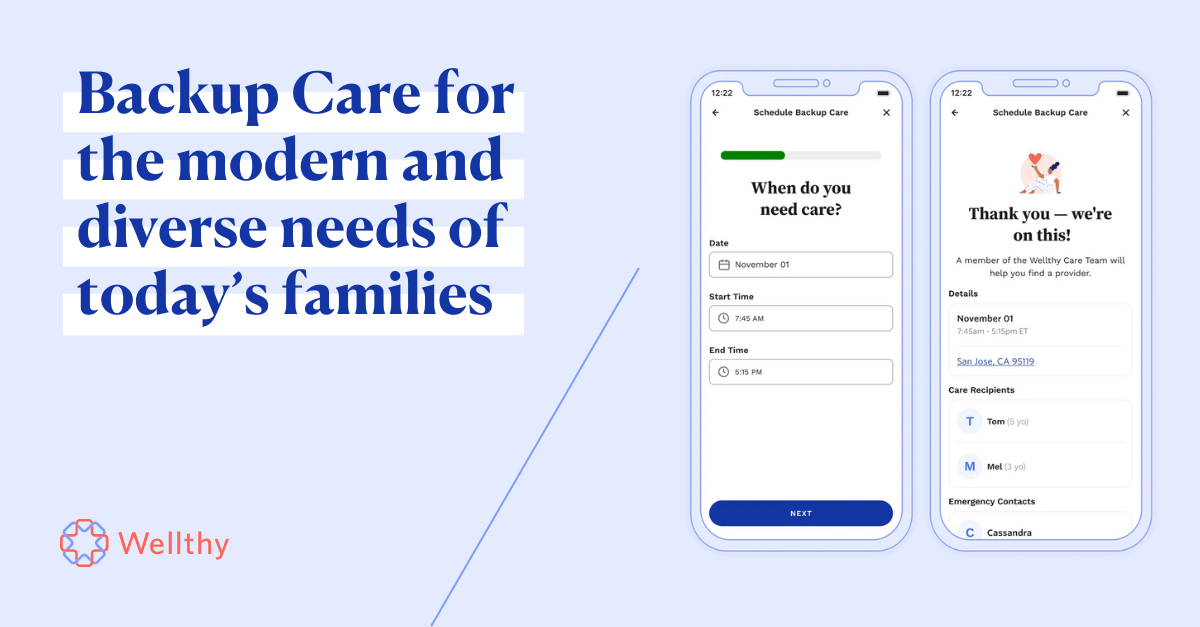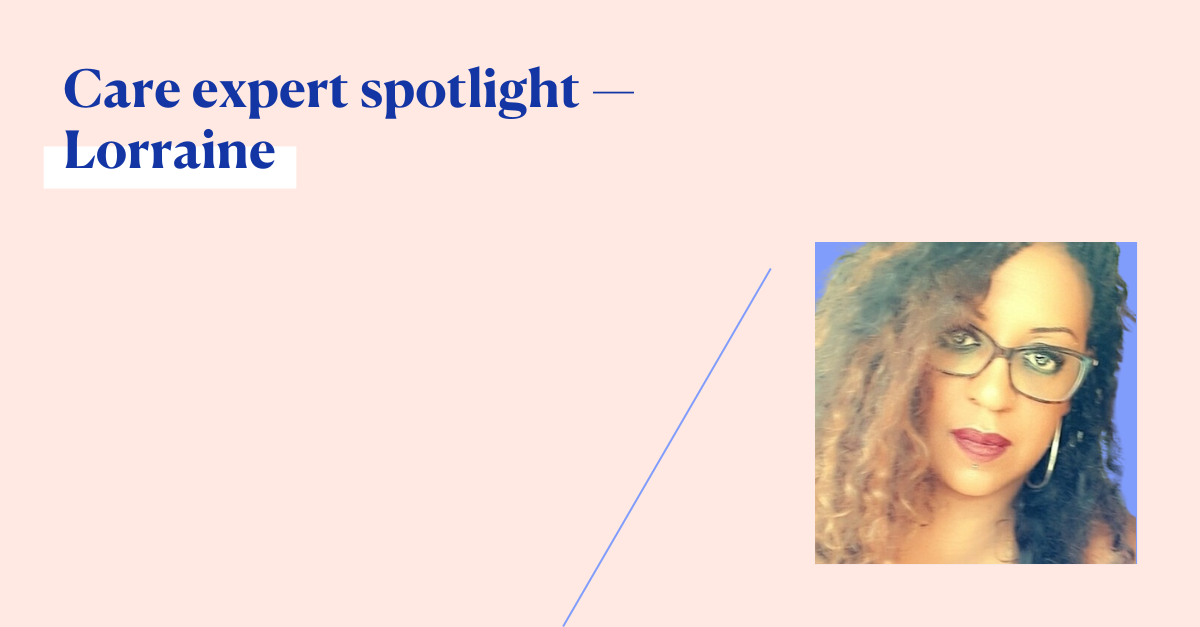With our Care Expert Spotlight series, we’re taking a peek into the lives of Wellthy's amazing care professionals.
This month we spoke with Leigh, a Care Coordinator at Wellthy, with a background in home health, speech-language pathology, and geriatrics. Wellthy’s team of Care Coordinators and Advisers work directly with families to understand their care needs, create a care plan, prioritize tasks, and get things done on their behalf.
Leigh is also a Moderator for Wellthy Community, a peer support network for Wellthy members allowing family caregivers to connect with each other online. For more information on Wellthy Community, check out this post.
What does a speech-language pathologist do with older individuals?
I’ve been a Care Coordinator at Wellthy for about 2 years, but I’ve worked in home health care as a speech-language pathologist for over 20 years, mostly with geriatric patients.
My patients typically had cognitive difficulties stemming from dementia or strokes, or had difficulties communicating or swallowing. For example, we would complete throat and mouth exercises, especially if they had any paralysis or weakness that affected how well they could eat and drink.
I love that realm of work and helping people, but I found myself wanting to go beyond helping with speech-specific issues. I wanted to help get them set up with the resources they needed that they didn’t know about. So that’s ultimately why I decided to come to Wellthy where I can do that on a daily basis.
What is your personal caregiving story?
About nine years ago, my father had a stroke, which really hit home considering I’d worked with stroke patients for so long. He spent time in the hospital, in rehab, and then went home with home health. It gave me an incredible understanding of what it’s like to be on the family side of supporting a patient.
Everyone in my family looked to me for what to do because of my background. But it’s different when it’s your own dad. When I talk to families at Wellthy now, I tell them about this experience. I know what they’re going through and the questions going through their mind, like ‘Is he going to get better? Is he going to get back to what he was before?’ I hate that it happened to my father, but I’m thankful to have that perspective now to help other families better.
At what stage are families coming to Wellthy for support?
Some families come to us knowing a fair amount – usually this is the case if they’ve been dealing with a chronic illness or diagnosis for a long time.
What I tend to see more of though, is members coming to us when a medical crisis has happened like a fall, stroke, or dementia diagnosis. They’re new to this so they don’t even know if they’re going to the right doctors for help. It’s starting from square one and that’s where I love helping. We’re not going to fix everything of course, but I’m going to make sure that they get the help and resources they need.
What advice would you give to a first-time caregiver?
Talk to others. Caregiving is like any other difficulty in life. We assume that no one else is dealing with what we are and that’s just so far from the truth. Almost everyone knows what it’s like to feel like a caregiver, whether that’s for parents, children, or even a pet with a chronic illness. I always encourage the families I work with to join a virtual or in-person support group, even if they don’t feel like they need it yet because they will.
I worked with a family last year in which the mom had a stroke in her early 60s, which is pretty early and is actually around the same age my father had his stroke. I became really close with the daughter who opened the Care Project because she was younger and none of her friends had gone through this yet with their parents. She would tell me how much she looked forward to our calls because it was her time to speak with someone who understood what she was going through and was at a similar life stage.
What is a memorable Care Project that you worked on?
I worked with a family in which the mother and father moved across the country to live with their daughter. The plan was for the parents to move in temporarily and then get a small place nearby. Originally, she involved Wellthy to find new providers in the area for her parents. Sadly, shortly after her parents arrived, the daughter realized that her mom’s memory was suddenly really bad and deteriorating very quickly.
I asked the daughter, ‘Well, how exactly is her memory bad? What are you noticing?’ From my experience, I knew that what she was describing to me was not typical aging-related memory issues. I told the daughter that she needed to take her mother to see a neurologist – my biggest fear was that the concerns would get waved off, so I coached her on what to say in the appointment. This was back in 2021 when there was basically no availability of neurologists accepting new patients. There was also a language barrier. After looking and looking, we found this perfect neurologist who met all of their needs, but there was a 3-4 month wait. So the Care Adviser and I called every single day until there was a cancellation – we were able to get her an appointment in about 10 days.
The doctor immediately knew something wasn’t right. She ended up being diagnosed with glioblastoma, which is a very fast-growing cancerous tumor in the brain. They got her the resources she needed, but sadly she went into hospice and died about 2 months later. The daughter called me crying when they got the diagnosis. She had never in a million years expected this. It was truly an hour to walk through that with them.
How does your medical background help you in your work on Care Projects?
I can generally guide them in the right direction, even though I can’t give medical advice. I ask a lot of questions without making any assumptions. Then I can hopefully point them in the right direction. If they tell me something I find concerning about their parents’ memory loss, I’ll say things like ‘Have you told your doctor that your mom drove somewhere last week and couldn’t find her way home?’ or ‘Have you told your dad’s doctor that he forgot how to use his washing machine?’ It’s the little things that people don’t realize they need to tell their medical professionals. When you just say ‘memory difficulty’ to doctors, a lot of time it’s brushed off as a part of aging.
*Note: Wellthy Care Coordinators and Advisers do not provide medical advice.
What is one thing you wish families knew?
It’s not a matter of if, but when. If nothing else, my experiences, both personal and professional, have taught me that you need to have everything in order before a crisis occurs. Once a medical crisis happens or your parent’s cognitive abilities are gone, it’s too late. It sounds very morbid, but it’s true. There’s so many proactive things you can do to care for yourself and your family before you even need it.
Are there any mistakes you see commonly made related to in-home support?
People think that home health or skilled therapy is something they can dictate how much and what type of help they need. In actuality with skilled therapy such as physical therapy or speech therapy, the agency will tell you when they’re coming. They work with you and your doctor to determine a plan of care. Your level of functional progress will determine the duration of time they’re coming to your home. This is what is covered by insurance.
Non-skilled therapy is not covered by insurance, but you do get to tell them when they need to come and what you need help with. For example, ‘I need help 3 days a week for 4 hours to help with meal preparation and light housekeeping.’ This is an out-of-pocket expense.







